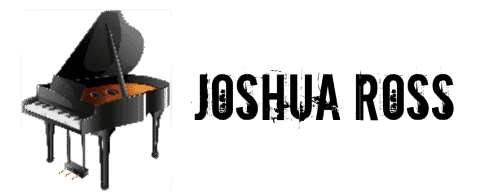As an Amazon Associate I earn from qualifying purchases.
Starting a career as a pianist can be overwhelming at first. Whether it’s performing, teaching, or freelancing, it’s tough to know how to make money playing piano. As a concert pianist myself, I’ve done just a bit of everything to make a solid income from my talents.
In this article, I’ll share 7 different ways you can make money playing the piano. I’ll explain how to get started with each strategy, the advantages and also the disadvantages of each. Let’s start off with the easiest plan first; teaching lessons.
Want to Learn Piano?Click Here

1. Teaching Piano Lessons
An easy avenue to get started making money right away in piano is to start teaching piano lessons. Piano lessons can be very lucrative if you can build a large roster of students. Here are some strategies for getting more piano students if you’re already teaching now.
While teaching piano lessons don’t involve a lot of playing, it’s still sensible to do. It’s something you can do on the side, or even make it your primary earner as you work on your performance career.
To start teaching all you need is access to a piano. Lessons can either be offered at your home, an academy, school, church, or at the student’s residence. To get some more ideas on how to much to charge for teaching piano lessons, check out this article.
The downsides of teaching piano lessons are that they are time-consuming. A typical piano lesson lasts 30 – 45 minutes. To make a full-time income teaching you may need to take on as many as 25 students on a weekly basis. Growing your roster of students also takes plenty of advertising.
Some of those students may also be adults who present a unique challenge when it comes to teaching compared to children. If you have a desire to perform music, then scheduling in practice time is crucial.
On the positive side, you can set your own schedule if it’s a private piano studio.
2. Gigging
If you have a love for live performance but are finding work to be slow as a classical pianist, it may be a good idea to start gigging. This can include playing solo piano for a wedding or playing pop music with a local band.
There are many people looking for live music to entertain their guests. It’s not uncommon for someone to pay at least $250 per hour for your services. Outside of private gigs, there are corporate opportunities as well through hotels, banks, living communities, and exclusive clubs.
Services like Thumbtack and Gigmasters are great to start with when it comes to building up your clientele.
These services collect leads and then forward those to you. In order to quote the person who needs your services, you will have to pay a small fee. Because a majority of playing gigs take place on the weekend, they very rarely interfere with a day job.
You could teach piano lessons Monday – Friday and then gig on the weekends for additional income. It helps to be versatile in your playing styles if you do decide to add gigging to your work efforts.
Pianists should be able to play Jazz, Rock, Pop, Classical, and Oldies. It also helps to have a large database of repertoire to choose from. Knowing your audience is important, and if you make a great impression you could easily get rebooked.
One of the biggest benefits of gigging is that it pays well. Most gigs are also short in nature, often lasting a maximum of 2 hours.
The downside to gigging is that you’ll need to practice, especially if you’re playing with a full band. Pianists also need to be versatile in different musical styles which may not be comfortable for classical pianists especially.
3. Become A Freelance Accompanist
For those who want to try their hand at gigs, but in the classical style, freelance accompanying may be just right for you. This involves performing music with other chamber musicians. Most likely you’ll find work with violinists, cellists, and vocalists.
There’s also a lot of work to be found in the youth circuit as well. Every year high schools and middle school has performance examinations which require those students to have an accompanist.
Although not the most lucrative, it does provide a good bit of income if you’re willing to perform for a lot of people.
On a more professional level, you could make a substantial amount of income by collaborating with well-known musicians in the area.
On an international scale, it’s even better, because you’ll have an opportunity to tour with the same group to various venues performing the same repertoire.
The tough thing with freelance accompanying is that it takes a lot of effort to maintain your income stream. Pianists have to constantly look for playing opportunities. Some of the accompanying positions only last for a short time which is not ideal.
My advice would be to try and build up as many residual performance opportunities as possible. As you build your network of people to play with, stay in contact with them regularly so that you are always the first pianist to get offered the job.
Also be as flexible as possible. Most freelance accompanists get their start because another pianist was unavailable to fill the position, to begin with. Once you’ve built a relationship, try your best to maintain it and be as available as possible so that you gain future gigs.
With each successful performance come more credibility, and helps you become the preferred option anytime someone needs a pianist.
4. Book Your Own Solo Piano Concerts
Acquiring management as a solo concert pianist can be tough. The field is very competitive, and unless you win a major competition, it will be tough to land a deal.
Thankfully, you do not need an agent or management team in order to make a career out of playing the piano. If you’re willing to learn some basic marketing skills and embrace social media, you can do much of the work yourself.
For those just getting started with booking solo concerts, you could start with a local school or church. Many churches have yearly concert series and they are always looking for fresh talent to book. A simple email to the church administration can get you started there.
The nice thing with churches is that even if they cannot afford your booking fee, they will be more than willing to do a freewill offering for your services. This means that concert patrons can donate whatever amount they want for your services.
I’ve done several piano concerts this way and have ended up making significantly more than my standard booking fee on several occasions!
Most cities have local performing arts organizations who curate talent on a consistent basis. Reach out to them and let them know you’re interested in performing. Many times they can actually get you booked into some of the bigger venues in the area through their brand.
On an international scale, getting into the bigger venues for a solo concert can be tough without representation. This is where your ambition has to come into play.
Start off by making a list of all of the major venues you would like to perform at. Take notes on the caliber of artists who perform there, and be realistic about your chances of getting some serious attention.
Next put together a professional press kit. The kit should contain professional photos, a list of your accomplishments, and repertoire that you know well. Also, make sure to include your most up to date contact information.
Start reaching out to these places personally either through letter, email or by phone. Also, consider reaching out to them through an arts organization so that the bigger venues will take you more seriously.
Whether it’s a small or large venue you desire to perform at, one of the drawbacks is that doing the work yourself can be draining. To keep up a robust performance schedule will require you do research and find venues to perform at on a daily basis.
In some cases, it may take hours to find just a handful of places that you feel would work for your situation. The other downside is that even with a professional press kit, emails, and calls, that many of these places will not respond to you.
Of the small fraction that does reach out to you, an even smaller number will follow through to book you for a solo concert.
The good news is that no matter what, there will always be a venue looking to host a solo piano recital from an unknown artist. If you are patient then this can turn into a great source of income for you once your performance schedule fills out.
5. Play For Churches
A consistent flow of income for pianists is to take up a church job. This involves playing for church services on a regular basis. The duties usually include a weekly rehearsal, and two to three services on Sunday.
There are also occasional events the church may want to host, especially during the Christmas and Easter holidays.
If you’re a classical pianist, it’s a good idea to stick to sacred churches. These churches rely heavily on notation, and the style will completely fit you as an artist.
Baptist and Episcopal churches will require a different musical style. You’ll need to be comfortable playing gospel music and improvising on a regular basis.
Most church jobs offer a pay per play structure. As long as you can find a substitute, you’ll still be able to travel and play or take time off when needed. Salary positions are more preferred because they generally pay more.
Because it’s a church, there’s not much of an opportunity to earn paid time off. Those are just a few things to consider if you do find a church you’re interested in performing at.
6. Compose Your Own Music
Composing your own music is a smart move if you’re a pianist. Not only is it a chance for you to develop as a musician, but you can make money by selling them online.
There are always new compositions surfacing online and being sold on popular sheet music websites. The more music you create, the more profit you’ll be able to make and build a brand.
You could even debut your music at your next solo recital. Many concert series are also looking to book artists who play music that no one has ever heard.
7. Become A Studio Pianist
Producers, bands and artist managers are always looking for studio pianists to come record for their albums and projects.
Often referred to as session musicians, studio pianists are professionals who have great sight reading skills and an ability to learn music quickly. The type of projects you may work on vary.
Some of the work will be for movie scores, and other projects may be commercial jingles. Session musicians are also hired to perform backing music in live concerts as well. Studio pianists make around $100,000 per year!
Hello & thanks for stopping by! I’m a professional concert pianist and piano instructor. In the United States, I’ve given successful performances in several places including New York, Florida, Connecticut, & New Jersey, I have also performed internationally in Italy and made my Carnegie Hall debut in 2014. I enjoy blogging about the piano, the art of performance, general music, current events and the latest in music production.

How To Become A Piano Teacher - Joshua Ross
Thursday 31st of January 2019
[…] There are alternative ways to make an income by playing the piano, just have a look at some ways to make money here playing the piano. […]